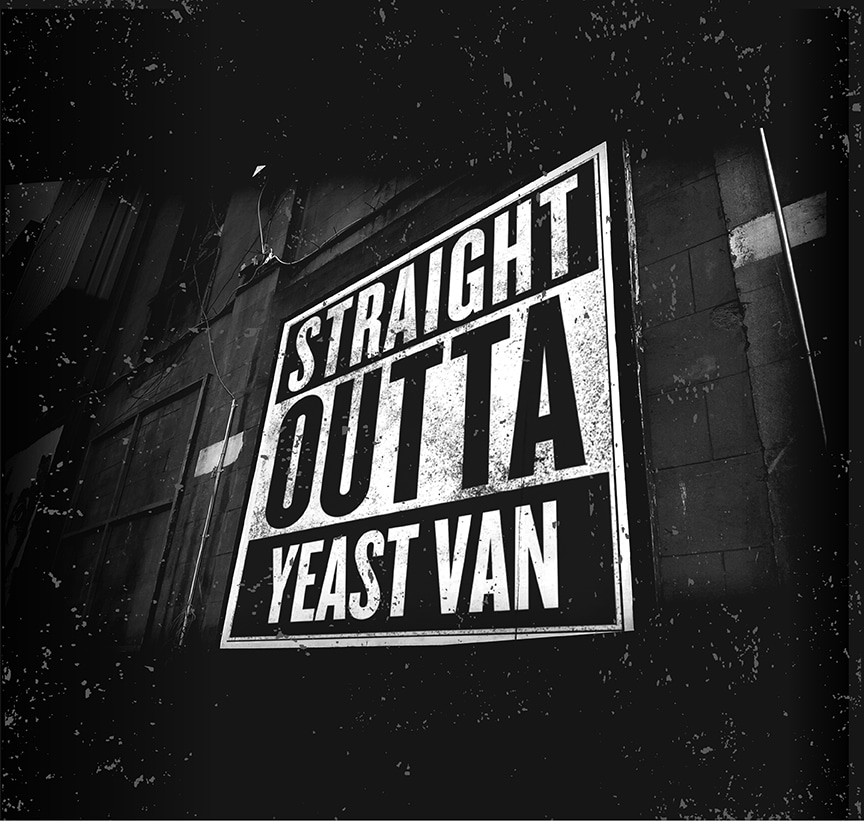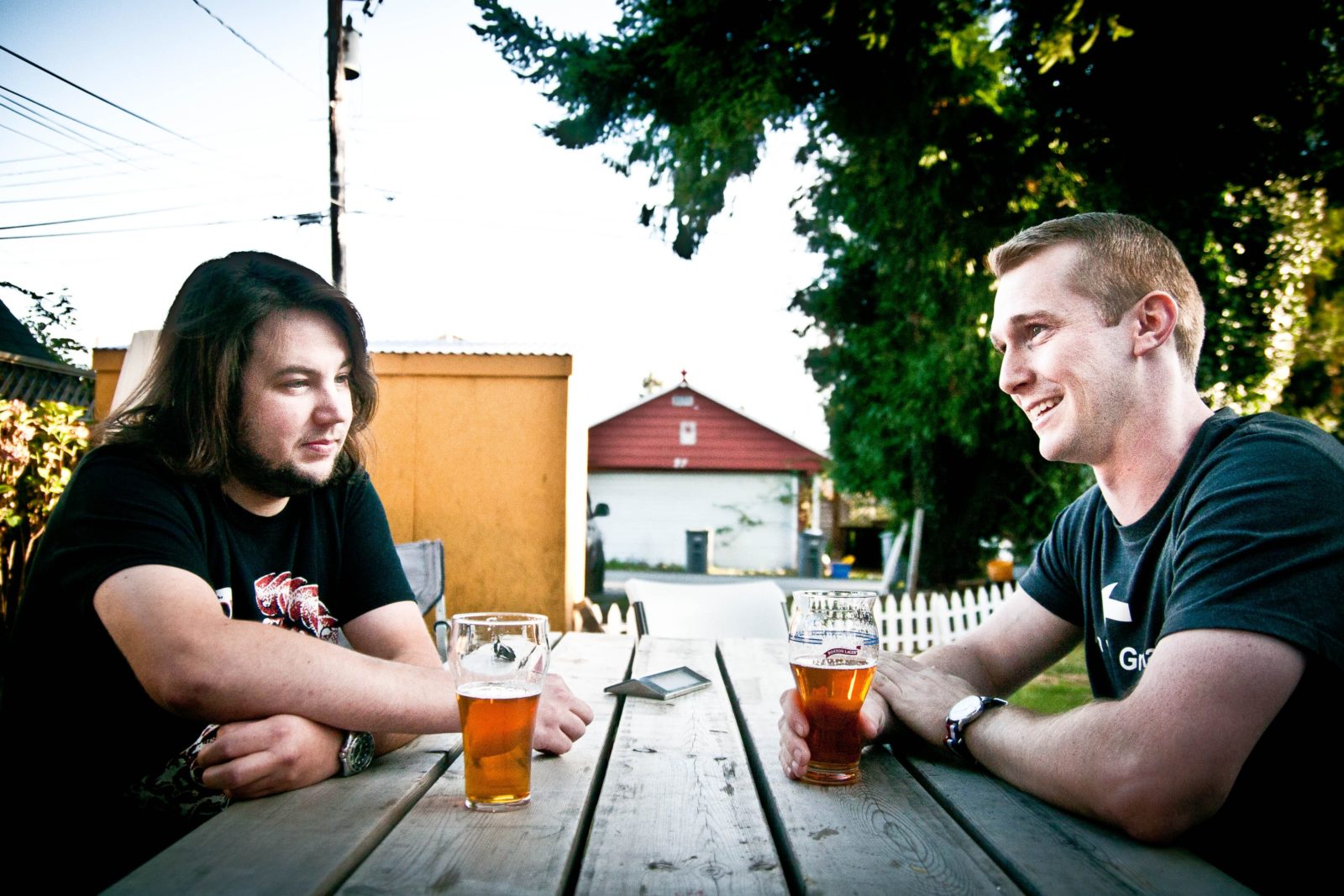
Over the course of the last few years, Brewer vs. Brewer has interviewed some of the best professional craft brewers in the province. But what about the thousands of homebrewers out there? Just because someone doesn’t get paid to make great beer for a living, doesn’t mean they can’t make great beer.
In garages, basements, backyards and cramped apartment kitchens across BC, some of the best craft beers you’ll never get a chance to taste are being created. Many of the professional brewers at places like Parallel 49 and Doan’s Craft Brewing Company started off making beer on their kitchen stove. In fact, close to 20 former members of the Vanbrewers homebrew club are now working as professional brewers.
We sat down with two well-known BC homebrewers to talk about what sparked their love for beer and how the homebrewing scene has changed as craft beer has exploded in popularity.
Scott Butchart is president of Vanbrewers, one of Canada’s most active homebrewing clubs with more than 250 paid-up members. Novia Chen is a two-time BC Beer Award Homebrewer of the Year winner and member of the Tri-Cities Homebrew Club.
We got them together at Dan’s Homebrewing on East Hastings Street in Vancouver, where many a homebrew obsession has begun.
Growler: So tell me about how you discovered the exciting world of homebrew?
Scott Butchart: I got into homebrewing on a CAMRA [Campaign for Real Ale] bus trip to Mission Springs Brewery. Everybody was sampling the wares they had brought on to the bus and this guy and his girlfriend were sitting in front of me and they had a bottle of homebrewed tripel and the guy passed it back to me. I was like, what is this, where is this from? And he goes, I made it! I thought he was totally kidding. So I was like, how do you make this, it’s incredible! He invited me down to his house the next weekend and that’s when I started brewing. That was Graham [With] of Parallel 49 and Katy [Wright], she’s the sales rep now for Canada Malting. So the first homebrewers I’d ever met got me into homebrewing, and they just turned out to be mind-blowingly good at it. That was 2007, 2008?
Novia Chen: My partner Sho [Agawa] and I, we were both poor grad students and met in grad school in Ohio… and when we came to Vancouver five years ago, we looked around and we were just like, hmmm, there’s no more cheap beer anymore, like these 12-packs for seven dollars like in the US. So we started looking up homebrewing websites and we calculated we could make a bottle of beer for 30 cents, and it was good beer! Yeah, definitely saving money, pretty typical grad student experience.
Growler:What was it about homebrewing that appealed to you? Why’d you stick with it?
Butchart: For me it was like for most people, “Oh this is cheap!” Yeah, 30 cents a bottle, 20 litres for 20 bucks or whatever. So I kinda started out like that. Then once I got through a few batches, it really shifted for me. I started with all-grain right away, so you had control over what was happening, you could see how you were altering small things and that would change things down the road. It’s like cooking; you can make exactly what you’re looking for, with enough knowledge. And now, it’s just sort of what I do. Every week it’s like, OK, I’m going to make a beer, or a cider, or a hot sauce. Fermentation suddenly became a big part of my life, basically.
Growler: So, Novia, I imagine as a poor grad student you probably live in a tiny apartment. How do you manage brew in such a small space?
Chen: Yeah, we started picking up brewing equipment here at Dan’s and we were doing five-gallon batches, but it was just too much to bottle. So we started doing three-gallon batches and that was much easier. We got a free mash tun which Sho converted from a cooler. Space-wise, we just make sure everything fits and is a wise decision to bring into the house. If I can give any advice to future homebrewers living in an apartment, be aware that you’ll need more space eventually, because you’re going to get greedy. We didn’t have a kegging system until recently, and I’m trying to limit us and not get a 20-pound CO2 tank, because we don’t have any space.
Butchart: You’ll get one, though. It’s inevitable.
Growler: Do you have one?
Butchart: I have two!
Growler: So Scott, you’ve been brewing since 2008 or so, a lot has happened in the craft beer scene in Vancouver since then. How has that impacted the homebrewing scene?
Butchart: We noticed that there was a marked increase in interest in about 2009, 2010. There wasn’t a homebrew club in Vancouver before, so once people learned they could go somewhere and hang out and learn as a group and get critical feedback on their beers, a lot more people started coming out. And the increase of breweries has been crazy. We have, I think, 18 members and former members who are professional brewers now. Probably more than that, actually. It’s a pretty big list.
Chen: Do they still come back to participate?
Butchart: Yeah, some of them do. The ones that have been brewing professionally for a while are obviously pretty busy, but then there’s people like Tak [Guenette, brewmaster at Gladstone Brewing in Courtenay] who brew all week at their job and brew at home four days a week, too. But yeah, the affect has been pretty huge, it’s increased the knowledge base for our brewers, there’s way more beer styles available and interesting things coming out all the time, so people go, “That’s awesome, I want to make that!”
Growler: Since you started brewing your own beer, do you still venture out and visit craft breweries?
Chen: Of course! I think there’s been complimentary growth between homebrewing and craft brewing. They’re not just kept in their own limited circles. For us, we’re always trying to brew new styles of beer, so we’re looking up those new beers and trying ones we’ve never had before.
Growler: Do you spend a lot of time coming up with names for your beers?
Chen: At the BC Beer Awards, our mild ale, Sho named it “Pubic Secrets,” and they never announced the name. They made the right choice.
Butchart: They [BC Beer Awards organizers] ran it by me, and I was like, no, no, no, do NOT read that out!
Chen: What about you?
Butchart: No, mine are like, Scott’s Brown Ale, Scott’s IPA, that kind of thing. Actually, we have a competition coming up and there’s like 350 entries, and I absolutely hate judging IPAs, so I decided to brew one so I don’t have to judge them. I’m calling it Six Dollars of Happiness. It cost me six bucks to brew it, but I’m out, so it’s perfect.
Growler: Do you guys harbour any ambitions to go pro?
Butchart: Short answer, no. I think I like it being my hobby. I like having control over it and I’m not making anything for anybody else. I can make a foreign export stout that’s pretty bitter if I want to. I love it, but it would never sell. Also, I have a day job that I’m compensated well for.
Chen: You spend a lot of time judging and organizing events, don’t you? Does that eat up a lot of your time?
Butchart: It does! I probably put in, like, 20 hours a month into the club. It used to be a LOT more, but now I have people I can hand stuff off to. I guess it’s a bit more than a hobby. Judging our competitions is a big part of that. Actually, I think anybody that’s a homebrewer should really look at getting certified as a beer judge. It just increases your knowledge so much. That’s how my beer got better, just by doing the [Beer Judge Certification Program]. People come to our homebrew meetings and there’s maybe 40 people there, and 12 of them are beer judges. So people walk around the room and are like, “Hey, what’s wrong with my beer?” and they go “Oh, I’ll tell you!”
Chen: For me, it’s important to finish my PhD. But there’s always that possibility to switch gears from amateur to professional for a lot of homebrewers.
Growler: So if someone is looking to get into homebrewing, where should they start?
Chen: Reading helps. That will teach you some of the basics. Places like Barley’s, Beyond The Grape, Dan’s Homebrewing, they all provide great help. Yeah, it can be a bit intimidating at first, but they really want to help you. So don’t be afraid to ask questions and just start brewing!




